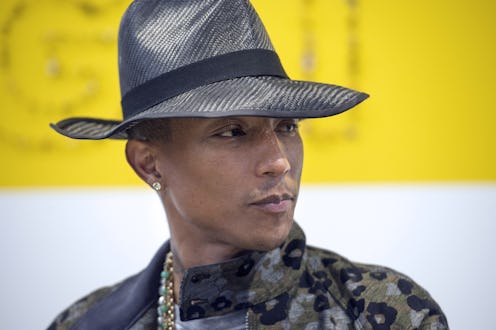Entertainment
Is Creative Freedom the Victim Here?
In the wake of the "Blurred Lines" copyright case, Pharrell Williams worries that creative freedom is the real victim here. “The verdict handicaps any creator out there who is making something that might be inspired by something else,” Williams told the Financial Times. Just to refresh your memory, Williams and Robin Thicke have been ordered to pay the Marvin Gaye estate $7.3 million dollars after the federal court ruled "Blurred Lines" sounded too similar to Gaye's "Got to Give It Up." Williams, though, cites this more as inspiration, and copyright rulings like this stifle artistic process:
"If we lose our freedom to be inspired we’re going to look up one day and the entertainment industry as we know it will be frozen in litigation. This is about protecting the intellectual rights of people who have ideas”
Personally, "Blurred Lines" was never offensive to me because it sounded like "Got to Give It Up," it was offensive to because of it's exceptionally rape-y lyrics and a uniquely objectifying music video. But putting those feelings aside, I do understand where Williams is coming from. Absolutely.
Here's the thing, kids. There are so many notes and possible note combinations, so at this point in history, it's really difficult to create something purely original. Honestly, how many songs are made up of the same three guitar chords? It is absolutely plausible to be unintentionally inspired, coincidentally copy, or even to consciously riff on pre-existing work. People do it all the time, and in fact, people make CAREERS out of doing that.
For example, Girl Talk AKA Gregg Michael Gillis is known for exclusively being a mash-up artist, that is, he remixes different pieces of music and creates new music out of this mish-mosh of samples. And artist Richard Cheese, real name Mark Jonathan Davis, exclusively does lounge covers of modern music (his take on System of a Down is to die for). This can be done with the idea that the artist is really making the pre-existing music their own.
But does that extend to the gray area that is a pop star sounding strongly similar to another popular musician? When Lady Gaga put out "Born This Way," critics compared it to sounding strongly similar to Madonna's "Express Yourself." Gaga did NOT take to this criticism kindly, and later told NME:
I will look in your eyes and tell you that I'm not dumb enough or moronic enough to think that you are dumb or moronic enough not to see that I would have stolen a melody. If you put the songs next to each other, side by side, the only similarities are the chord progression. It's the same one that has been in disco music for the last 50 years. Just because I'm the first f*cking artist in 25 years to think of putting it on Top 40 radio, it doesn't mean I'm a plagiarist, it means I'm f*cking smart.
This is an interesting point as well: if "Blurred Lines" didn't win the crown as 2013's song-of-the-summer, there wouldn't be as much of an attack on it. It got far more exposure than an avant-garde mash-up artist or an modern Frank Sinatra covering Limp Bizkit. When a song's constantly played in Pathmark, you eventually can make that comparisons. Furthermore, although less famous artists CAN get pegged for copyright infringement, there's far less of a financial well to draw from. So the popularity of "Blurred Lines" ultimately led to it's downfall, but it still begs the question: did Thicke and Williams make their song their own?
Honestly? I think they did. They made it into a sleazy tune that shut down the freedom of consent, one that elicited parody after parody because of it's sheer offensiveness. But nonetheless, that was THEIR song. I get it.
So yes, Virginia, although I'm shocked with myself, I'm with Williams on this one. The music industry, especially today and especially with pop music, is really more about re-inventing the wheel as opposed to creation of something truly unique. Still, if there's enough intention to make a song your own, then litigations and lawsuits only hinder the work of artists. I'm not pro-"Blurred Lines" by any means, but I am pro-creative freedom, and I can see how this was at least in part about that.
That, and money. Always.
Images: Giphy (1)
